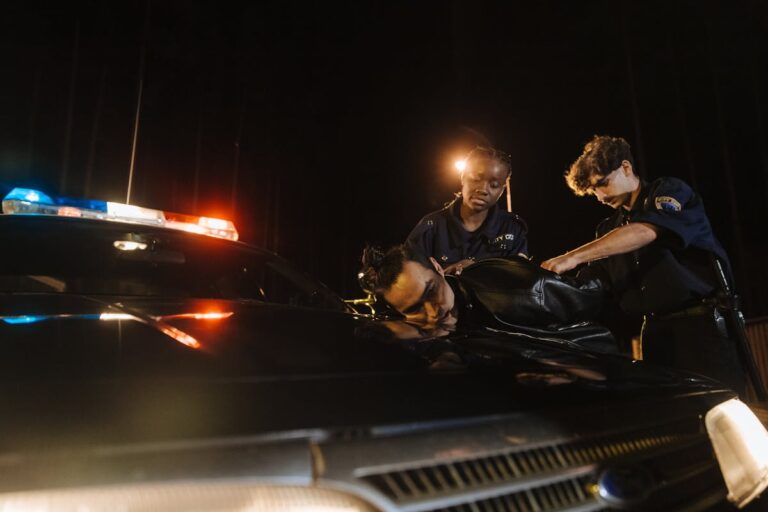Can A Police Officer Make An Arrest Without A Warrant?

The law enforcement landscape is a complex web of rules and regulations, one of which includes the circumstances under which a police officer can execute an arrest without a warrant. While it is generally understood that arrests typically require a warrant, there are distinct scenarios where this may not be the case. Such warrantless arrests raise questions about the balance between public safety and individual rights. By exploring the legal framework surrounding these instances, we can better grasp the intricacies of this critical aspect of policing. This understanding could potentially reshape our views on law enforcement practices and their implications for civil liberties.
Understanding Warrants and Arrests
Within the domain of law enforcement, understanding the role of warrants and arrests is vital. Warrants, authorized by a judge, are legal documents granting law enforcement the authority to conduct searches, seize property, or arrest individuals. Understanding warrant types and arrest procedures provides an all-encompassing insight into the process and nuances of law enforcement actions.
There are various types of warrants, each with its distinct purpose. Search warrants authorize law enforcement officials to search a location, while arrest warrants empower them to detain a particular individual. Bench warrants, issued by judges, call for the arrest of individuals who have failed to appear in court.
Arrest procedures, underpinned by the Fourth Amendment, require law enforcement officers to identify themselves, inform the individual of the arrest and its cause, and advise them of their rights. Following these procedures guarantees the legality and constitutionality of the arrest.
Understanding these complex mechanisms is critical in maintaining the balance between individual rights and public safety. It curtails potential abuses of power, fostering trust in law enforcement. Knowledge of the intricacies of warrant types and arrest procedures is therefore indispensable in comprehending the dynamics of law enforcement.
Arrests Without Warrants: The Basics
Contrary to common belief, police officers are not always required to have a warrant to make an arrest. In the interest of public safety, law enforcement has the authority and duty to apprehend individuals suspected of committing a crime, even when a warrant is not immediately obtainable.
This principle is rooted in the understanding that crimes often occur in circumstances where obtaining a warrant isn’t feasible. The urgency to intervene for safety and justice may supersede the normal mandate of obtaining a warrant. The premise here is that delaying the arrest could potentially endanger the public or result in the suspect evading apprehension.
However, this doesn’t imply an absolute freedom for officers to arrest without warrants. The Fourth Amendment of the U.S. Constitution protects citizens against unreasonable searches and seizures, including arrests without a warrant. Consequently, for an arrest to be considered valid without a warrant, there must be probable cause. This means that officers should have credible evidence or reasonable belief that the person has committed or is about to commit a crime. Ergo, law enforcement’s power to arrest without a warrant is a delicate balance between public safety and personal liberties.
Exceptions to the Warrant Requirement
Despite the general rule requiring warrants for arrests, there are notable exceptions where law enforcement can take a suspect into custody without one. These exceptions typically involve exigent circumstances or matters of public safety.
Exigent circumstances refer to situations that demand immediate action to prevent physical harm, destruction of evidence, or the escape of a suspect. In these scenarios, the police officer’s obligation to protect and serve outweighs the necessity for a warrant. For instance, if an officer is in pursuit of a suspect who enters a private property, the officer can follow and make an arrest without a warrant due to the exigency of the situation.
Public safety also presents a significant exception to the warrant requirement. If an officer reasonably perceives an immediate threat to the safety of the public, they have the authority to act swiftly, bypassing the warrant process. This includes instances where individuals are in possession of dangerous weapons in public spaces or when a terrorist threat is imminent.
Probable Cause: A Key Factor
In the framework of law enforcement, the concept of probable cause plays an important role in determining whether an arrest without a warrant is justified. This notion, governed by probable cause standards, is a cornerstone of the Fourth Amendment, which protects citizens from unreasonable searches and seizures.
Probable cause definitions generally stipulate that an officer has sufficient reason to believe that a crime has been committed, and the person in question is implicated. This belief should be based on factual evidence rather than mere suspicion. The standard guarantees that officers don’t act on whim or bias but rather sound judgment backed by concrete evidence.
The probable cause standards serve as a safeguard, balancing the needs of law enforcement while maintaining the rights of citizens. However, the determination of probable cause can often be subjective, leading to potential abuses of power. This subjectivity is where the court’s role becomes vital in reviewing and interpreting instances of probable cause.

Implications for Citizen Rights
While the concept of probable cause provides a theoretical safeguard against arbitrary law enforcement actions, it is the practical implications for citizen rights that warrant further examination.
The balance between citizen privacy and police authority is a delicate one, and is often tipped in favor of the latter when an arrest without a warrant occurs. This is because the officer’s judgment about the existence of probable cause is not immediately subject to review, potentially compromising the citizen’s right to privacy.
When an arrest without a warrant is made, citizens are often left feeling vulnerable and violated, not just physically, but also regarding their civil liberties. The potential for misuse of police authority in these situations is high, especially in cases where officers may be motivated by bias or prejudice rather than genuine probable cause.
Therefore, it is crucial to guarantee that the principle of probable cause is not just a theoretical construct, but one that is strictly adhered to in practice. This can be achieved through rigorous police training and oversight, as well as legal recourse for citizens who believe their rights have been infringed. Such measures are essential to protecting the rights of citizens while still maintaining the necessary authority of the police.
Case Examples and Legal Precedents
Examining a few key legal precedents helps to illuminate the intricacies and potential pitfalls of arrests made without a warrant. One pivotal case is United States v. Watson (1976), where the Supreme Court upheld the arrest authority of officers to make warrantless arrests for felonies committed in their presence or based on probable cause.
This case defined warrant procedures, confirming that officers do not always require a warrant to make a lawful arrest. Instead, the Fourth Amendment’s prohibition on unreasonable searches and seizures governs the officer’s conduct. In Atwater v. City of Lago Vista (2001), the Court further clarified that even minor offenses, such as a seatbelt violation, could justify a warrantless arrest.
However, the Court has also set boundaries for this power. In Welsh v. Wisconsin (1984), it ruled that without exigent circumstances, officers could not make warrantless arrests in a person’s home for minor offenses. These precedents underscore a delicate balance between maintaining public safety and protecting individual rights. This balance is essential to understanding the complexity of the arrest authority in the context of warrantless arrests.
Misconceptions About Warrantless Arrests
There are several misconceptions about the legality of warrantless arrests, which often cloud public perceptions. These misunderstandings can be clarified by thoroughly analyzing the concept of warrantless arrests and citing relevant legal precedents. Consequently, dispelling these myths can provide a balanced and clear understanding of when and under what circumstances a police officer can make an arrest without a warrant.
Understanding Warrantless Arrests
Do you believe an officer cannot make an arrest without a warrant? If so, you’re not alone in this misconception. However, it’s vital to demystify this misunderstanding and gain a deeper understanding of warrantless arrests.
Warrantless arrests are not an uncommon phenomenon. In reality, law enforcement often relies on them in various scenarios. This might seem counter-intuitive given our societal understanding of warrants as a prerequisite for arrests. However, it’s important to understand that the law allows for certain exceptions.
Not all arrests necessitate a warrant. For instance, if an officer witnesses a crime being committed, they have the legal authority to make an arrest on the spot, even without a warrant. This is due to the immediacy of the situation, which leaves no time for obtaining a warrant.
Understanding warrantless arrests is critical for citizens to know their rights and for law enforcement to guarantee they operate within the boundaries of the law. The next time you come across a situation involving a warrantless arrest, remember that it’s not necessarily an unlawful act. In fact, it might be a strategic move by law enforcement to maintain law and order.
Legality of Warrantless Arrests
A significant portion of the population harbors misconceptions about the legality of warrantless arrests, often resulting in unwarranted fear and confusion. Contrary to popular belief, warrantless arrests are not inherently illegal. Arrest authority is granted to law enforcement officers under specific circumstances when a warrant is not required.
Understanding the warrant policy is vital to dispelling these misconceptions. Primarily, an officer can make a warrantless arrest when they have probable cause to believe a crime has been committed. Probable cause is a reasonable belief, based on facts and circumstances, that a person has committed a crime. This authority extends to situations where an officer witnesses a crime being committed.
Furthermore, the exigency of circumstances can also justify warrantless arrests. This principle allows officers to act immediately in situations that demand urgent action, such as preventing a suspect’s escape, destruction of evidence, or threats to public safety.
Failing to understand these legal provisions can lead to misconceptions and unnecessary panic. As a result, it is important to be aware of the legality of warrantless arrests, which are an integral element of the law enforcement’s arrest authority, guided by the warrant policy and constitutionally defined circumstances.
Case Examples: Warrantless Arrests
Misconceptions surrounding warrantless arrests have often been fueled by high-profile case examples, distorting public perception of these law enforcement measures. Many believe that warrantless detentions are an overreach of police power, but this is not always the case. Understanding the circumstances that justify such actions is essential in dispelling these misconceptions.
In fact, the law affords officers significant police discretion when it comes to making arrests without a warrant, particularly in situations where public safety is threatened. For example, if an officer witnesses a violent crime in progress, he is legally authorized to arrest the perpetrator immediately, even without a warrant.
Furthermore, the U.S. Supreme Court has upheld warrantless arrests in numerous cases. In the landmark case of United States v. Watson (1976), the Court ruled that a felony arrest without a warrant, based on probable cause and occurring in a public place, did not violate the Fourth Amendment.
Therefore, by examining these case examples, it becomes evident that warrantless arrests are not inherently unlawful or an abuse of power. They are, however, subject to specific legal prerequisites and are an important tool for law enforcement in preserving public safety.
Frequently Asked Questions
What Penalties Can a Police Officer Face for an Unlawful Arrest?
A police officer involved in an unlawful arrest could face penalties such as disciplinary actions, job termination, and civil liability for unlawful detention. These might also include monetary damages awarded to the unlawfully arrested individual.
Can Citizens Resist a Warrantless Arrest if They Believe Its Unjustified?
Citizen rights provide limited scope for resisting an arrest in certain jurisdictions. However, combating police authority can potentially escalate the situation. It is generally advised to comply peacefully and address grievances through legal channels post-arrest.
Do the Rules for Warrantless Arrests Differ Between States?
Yes, warrantless arrest regulations can vary between states, despite a common federal framework. These variations often concern the interpretation of warrant exceptions, which can lead to differing enforcement practices across jurisdictions.
How Can One File a Complaint if They Feel Theyve Been Wrongfully Arrested Without a Warrant?
To file a complaint for a perceived wrongful arrest, one must follow specific filing procedures. This usually involves contacting local law enforcement’s internal affairs division or a civilian review board to initiate the complaint process.
Does the Severity of the Suspected Crime Impact the Legality of a Warrantless Arrest?
Yes, the severity of a suspected crime can impact the legality of a warrantless arrest. In instances of serious felonies, immediate action is justified, while crime classification often determines arrest justification in warrantless situations.



